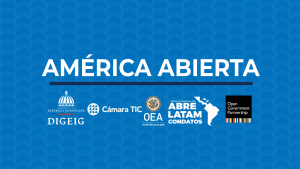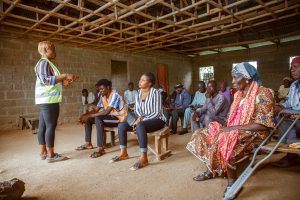Faces of Open Government – Milagros Ortiz Bosch
Rostros de Gobierno Abierto: Milagros Ortiz Bosch
This year, OGP and Abrelatam/ConDatos together with the Dominican Republic organized “América Abierta” in Santo Domingo, Dominican Republic from September 26 to 29, as a space to reflect on how to build a more open, transparent, participatory, and accountable Latin America.
The Advisor to the Executive Branch on Ethics, Transparency, and Anti-Corruption and Director General of Ethics and Government Integrity of the Dominican Republic, Dr. Milagros Ortiz Bosch, sat down with OGP to share her reflections on the open government process in the country and why the government and civil society are co-organizing América Abierta.
1. What does open government mean, and why is it important?
It is a paradigm shift in public management based on several fundamental axes: citizen participationAccording to OGP’s Articles of Governance, citizen participation occurs when “governments seek to mobilize citizens to engage in public debate, provide input, and make contributions that lead to m... More and collaboration, access to information, accountability, integrity, and the use of new technologies, to promote the co-creation of sustainable public policies that foster the development and quality of life, restoring citizen trust in the government.
Open government is relevant because when governments are more open and transparent with their citizens, they inspire greater confidence, provide collaboration and co-creation spaces, and promote quality public policies with a common goal: all their citizens.
2. The Dominican Republic is co-creating its fifth national action planAction plans are at the core of a government’s participation in OGP. They are the product of a co-creation process in which government and civil society jointly develop commitments to open governmen... with civil society organizations, journalists, advocates, activists, and other actors. What initiatives has the country been able to advance through OGP and what issues should be addressed in the next plan?
Through the open government action plans, we have developed significant initiatives: the Transactional Portal for Public ProcurementTransparency in the procurement process can help combat corruption and waste that plagues a significant portion of public procurement budgets globally. Technical specifications: Commitments that aim t... More and Contracting in the Dominican Republic and the Single TransparencyAccording to OGP’s Articles of Governance, transparency occurs when “government-held information (including on activities and decisions) is open, comprehensive, timely, freely available to the pub... More Portal of the Dominican Republic. This last one aims to make information available to citizens directly from the source, thus launching a process of systems interoperability such as the Financial Management Information System (SIGEF, per its Spanish acronym), the Public Servants Administration System (SASP), the Transactional Portal for Public Purchasing and Contracting and other management systems.
At the legislative level, the Dominican Republic passed the Law on the Protection of Personal Data and the Law on the Sworn Declaration of Patrimony from Public Officials.
Also, the country developed the Single Treasury Account, a financial tool that centralizes all public resources in a single bank account. Now, all the payments made by the institutions will be only channeled through the National Treasury, thus helping increase control and guaranteeing greater transparency in treasury management. The resources are directly incorporated into the budget stream, allowing them to be operated within the programming approach established by the laws of the Public Financial Administration System, permitting a transparent consolidation of public income and expenditure.
Another open government commitmentOGP commitments are promises for reform co-created by governments and civil society and submitted as part of an action plan. Commitments typically include a description of the problem, concrete action... is the disclosure of the institutional transparency evaluation system to monitor compliance with General Law 200-04 on Free Access to Public Information. Likewise, the pilot to implement integrity, transparency, and accountability instruments in Local Governments aims to increase transparency in the territories.
Given the proposals and problems that citizens have expressed in the thematic tables, the V National Plan of Action should include a commitment regarding mental health, a highly relevant issue, especially after COVID-19. This commitment must be enhanced by transparency, information technology and communication, and innovation in the provision of public services.
3. The Dominican Republic will host Open Americas/América Abierta, an event that will bring together reformers from the open government and open dataBy opening up data and making it sharable and reusable, governments can enable informed debate, better decision making, and the development of innovative new services. Technical specifications: Polici... communities to assess successes so far, challenges we still face, and roadmaps to build a more open region. Why did the Dominican Republic agree to co-host this event, and what do you hope will come of it?
The Dominican Republic has shown significant progress in open data and open government: in March 2022, the country created the first National Open Data Policy available to citizens through presidential decree No. 103-22. This decree also instructed the creation of the National Open Data Commission to manage the opening of public information in open formats.
Likewise, before the co-creation of its fifth national action plan, the country issued decrees No. 713-2021 and No. 9-22 to promote the principles of Open Government in the Dominican Public Administration. The public administration should encourage citizen participation and collaboration, innovation, the use of Information and Communication Technologies (ICT), and the creation of the Multi-Stakeholder ForumRegular dialogue between government and civil society is a core element of OGP participation. It builds trust, promotes joint problem-solving, and empowers civil society to influence the design, imple... for an Open Government.
These two milestones, together with the rescue of international commitments, gave way for the Dominican Republic to request the Organization of American States (OAS) to host Abrelatam and Con Datos. The international community welcomed the request. Subsequently, the country was invited to host the Regional Meeting of the Alliance for Open Government. América Abierta brings together these three international events in a single significant space.
The Dominican Republic agreed to host América Abierta to resume the much-needed social and economic recovery for our countries after two years in which we faced great challenges due to the pandemic.
It is necessary to create spaces for dialogue where civil society, the business sector, experts, and politicians from the Americas can meet with the interest of having an impact in the region. They will have to agree on how to implement the best policies and practices in terms of transparency, participation, open data, integrity, innovation, development and capacities of countries and societies.
3. Now that hundreds of people will be visiting your country at the end of September for Open Americas/América Abierta, what is your message to the participants?
América Abierta has a special significance for us. It will be happening two years after an unexpected health situation forced our continent to cling, as a certain path to survival, to the already unstoppable development of information technology. We were locked up but linked by the company of a computer.
During those days, we finished the fourth open government action plan and started building the fifth; while Open Data policies continued to create a new Right to Know paradigm.
This event is the accountability of the work we put in during those years of confinement and its results. It is a way of highlighting the ability to set a practical course for sustainable, human development, without exclusion. It is a way to show us what we have advanced and what we can learn and undertake.
That America Abierta takes place in our country gives great satisfaction and gratitude to civil society, the Dominican Government, and all citizens. America Abierta, I repeat, has a special significance for us. It reminds us of another unexpected event on the route of the discoverers, in October 1492, from this land, the Dominican Republic developed a tie with the continent, America, and the Caribbean. This is not an unexpected meeting. it is America building its modernity, its vision of the future. Welcome to the Dominican Republic.
Este año, OGP y Abrelatam/ConDatos se unen con República Dominicana para organizar “América Abierta” en Santo Domingo, República Dominicana del 26 al 29 de septiembre para pensar en formas para construir una América Latina más abierta, transparente, participativa y que rinda cuentas.
La Asesora del Poder Ejecutivo en materia de Ética, Transparencia y Anticorrupción y Directora General de Ética e Integridad Gubernamental de República Dominicana, la Dra. Milagros Ortiz Bosch, compartió con la Alianza para el Gobierno Abierto (OGP por sus siglas en inglés) sus reflexiones sobre el proceso de gobierno abierto en el país y porque el gobierno y sociedad civil están co-organizando América Abierta.
1. ¿Qué significa gobierno abierto y por qué es importante?
Es un cambio de paradigma en la gestión pública fundamentado en varios ejes fundamentales como el acceso a la información, la participación y la colaboración de la ciudadanía, la rendición de cuentas, la integridad y el uso de las nuevas tecnologías, con el fin de promover la cocreación de políticas públicas sostenibles que fomenten el desarrollo y la calidad de vida, restableciendo la confianza ciudadana en el gobierno.
El gobierno abierto es importante, porque en la medida en que los gobiernos son más abiertos y transparente con su ciudadanía, mayor confianza transmiten. Proveer a la ciudadanía de espacios de colaboración y cocreación, impulsan políticas públicas de calidad con un fin común que son todas y todos los ciudadanos.
2. República Dominicana está en proceso de co-crear el quinto plan nacional con organizaciones de sociedad civil, periodistas, defensores y activistas y más actores. ¿Qué iniciativas ha logrado avanzar el país a través de OGP y cuáles temas debería abordar en el siguiente plan?
A través de los planes de acción de gobierno abierto se han desarrollado iniciativas importantes, como el Portal Transaccional de Compras y Contrataciones Públicas de la República Dominicana.
De igual manera, otro compromiso de gobierno abierto fue la creación del Portal Único de Transparencia de la República Dominicana, el cual tiene como finalidad poner a disposición de la ciudadanía las informaciones de manera íntegra directamente desde la fuente, poniendo en marcha un proceso de interoperabilidad de sistemas como: el Sistema de Información de la Gestión Financiera (SIGEF), Sistema de Administración de Servidores Públicos (SASP), Portal Transaccional de Compras y Contrataciones Públicas y demás sistemas de gestión.
A nivel legislativo, producto de compromisos de gobierno abierto, la República Dominicana cuenta con la Ley de Protección de Datos Personales y la Ley de Declaración Jurada de Patrimonio.
Por otro lado, encontramos también como parte de los compromisos de los planes de acción de gobierno abierto la Cuenta Única del Tesoro, que es una herramienta financiera que centraliza todos los recursos públicos en una sola cuenta bancaria; de esa manera, todos los pagos que efectúen las instituciones serán canalizados a través de una sola entidad, la Tesorería Nacional, lo cual ayuda a elevar el control y garantizar una mayor transparencia en el manejo del erario. Gracias a ella, se incorporan los recursos a la corriente presupuestaria, permitiendo que puedan ser operados dentro de la lógica de programación que establecen las leyes del Sistema de Administración Financiera Pública, permitiendo la consolidación real de los ingresos y gastos públicos, lo cual es transparencia.
Otro compromiso de gobierno abierto es la publicación del sistema de evaluación institucional de transparencia, para monitorear el cumplimiento de la Ley General 200-04 sobre Libre Acceso a la Información Publica.
Igualmente, el piloto de implementación de los instrumentos de integridad, transparencia y rendición de cuentas en los Gobiernos Locales, el cual tiene como finalidad incrementar la transparencia en los territorios.
Para el V Plan Nacional de Acción, viendo las propuestas y problemáticas que los ciudadanos han expresado en las mesas temáticas, un tema de suma relevancia que ha salido a relucir en reiterados encuentros es la salud mental, tras el COVID 19, por lo que, potenciado por la transparencia, tecnología de la información y comunicación y la innovación en la prestación de los servicios públicos, entendemos que este plan debe contener por lo menos un compromiso en esta temática.
3. República Dominicana será sede de América Abierta, un evento que reunirá a personas reformadoras de las comunidades de gobierno abierto y datos abiertos para evaluar los éxitos realizados hasta ahora, los desafíos que todavía encaramos, y hojas de ruta para construir una región más abierta. ¿Por qué República Dominicana accedió a co-organizar este evento y que espera que salga de esto?
La República Dominicana ha tenido avances significativos en materia de datos abiertos y Gobierno Abierto, muestra de ellos es que el país en marzo de este año puso a disposición de la ciudadanía la primera Política Nacional de Datos Abiertos mediante decreto presidencial No. 103-22, la cual además instruye a la creación de la Comisión Nacional de Datos Abiertos, como instancia para la gestión de la apertura de la información pública en formatos abiertos.
Asimismo, la República Dominicana, con miras a iniciar la cocreación de su V Plan de Acción ante la Alianza para el Gobierno Abierto, emitió los decretos Núm. 713-2021 y Núm. 9-22, respectivamente, con el objetivo de fomentar los principios de Gobierno Abierto a ser implementados en la Administración Pública dominicana mediante la participación y colaboración de la ciudadanía, la innovación y el uso intensivo de las Tecnologías de la Información y Comunicación (TIC), así como la creación del Foro Multiactor para un Gobierno Abierto.
Estos dos hitos, unidos al rescate de los compromisos internacionales, dan paso a que la República Dominicana se postule ante la Organización de los Estados Americanos (OEA) para ser sede de Abrelatam y Con Datos, postulación que fue acogida por la comunidad internacional. Posteriormente, es invitada a ser la sede del Encuentro Regional de la Alianza para el Gobierno Abierto. De esta manera surge América Abierta, que reúne a estos tres eventos internacionales en un solo encuentro y espacio integral.
República Dominicana accedió a ser el país anfitrión de América Abierta porque, tras dos años en que la pandemia enfrentó a todos nuestros países a grandes retos, llegó el momento de retomar la recuperación social y económica tan necesaria para nuestros pueblos. Por eso, es importante crear los espacios de diálogo donde la sociedad civil, el sector empresarial, los expertos y políticos de América puedan reunirse, con el interés de impactar en la región al ponernos de acuerdo sobre cómo implementar las mejores políticas y prácticas en materia de transparencia, participación, datos abiertos, integridad, innovación, desarrollo y capacidades de Estados y sociedades.
- Ahora que cientos de personas estarán visitando su país a finales de septiembre para América Abierta, ¿cuál es su mensaje para las y los participantes?
“América Abierta” tiene para nosotros una especial significación. Estará sucediendo dos años después en el que una situación inesperada de salud obligó a nuestro continente a aferrarse, como un camino cierto para la sobrevivencia, al ya indetenible desarrollo de la tecnología informática. Estábamos encerrados pero vinculados por la compañía de un computador.
Para esos días nos despedíamos del IV Plan de Acción de Gobierno Abierto y nos aferrábamos a construir el V Plan; mientras las políticas de Datos Abiertos seguían creando un nuevo paradigma del Derecho a Saber.
Este encuentro es una rendición de cuentas de todo lo realizado en esos años de encierro y de sus resultados. Es una manera de destacar la capacidad de marcar un rumbo eficaz para el desarrollo sostenible, el humano, sin exclusión; es mostrarnos lo que hemos avanzado y lo que podemos aprender y emprender.
Que América Abierta se realice en nuestro país es de gran satisfacción y gratitud para la sociedad civil, el Gobierno dominicano y toda la ciudadanía.
América Abierta, repito, tiene para nosotros una especial significación, nos recuerda como otro hecho inesperado en la ruta de los descubridores, en octubre del l492, inició desde esta tierra, la República Dominicana una vinculación con el continente, con América y el Caribe. Este no es un encuentro inesperado, es la América construyendo su modernidad, su visión de futuro. Bienvenidos/as a la República Dominicana.
No comments yet
Related Content

Open Americas
Join us for Open Americas from September 26 to 29 in Santo Domingo, Dominican Republic.

Guía para escépticos del gobierno abierto – Edición de 2022
 Challenges and Solutions
Challenges and Solutions
Faces of Open Government: Daniel Carranza
Uruguay is implementing commitments from its fifth open government action plan, engaging a wide range of stakeholders including government agencies, civil society organizations...


Leave a Reply